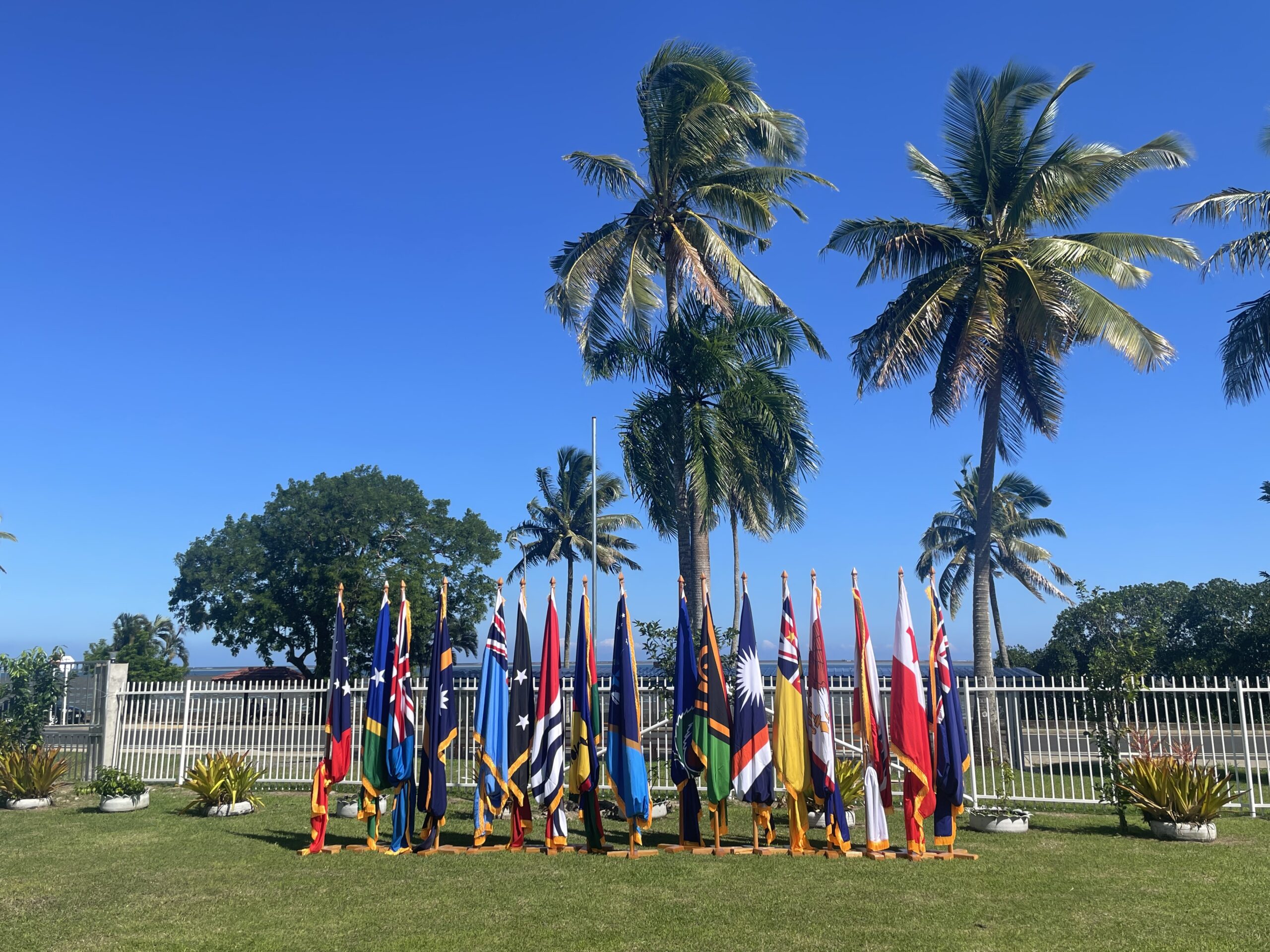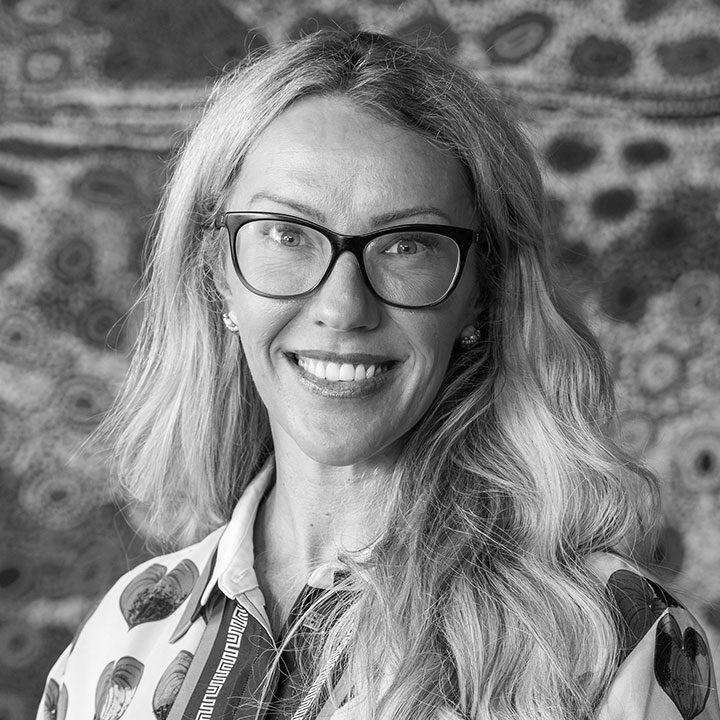
Fiji’s Pacific Theological College has transitioned to be the Pasifika Communities University.
Tetra Tech’s Indo-Pacific Managing Director, Amy Gildea, was a guest speaker at the launch and celebrations, and shared her own story of being a student of its ‘Whole of Life’ program.
When I first experienced the ‘Whole of Life’ immersive program at the Pacific Theological College as a Toloa*, something shifted. I didn’t just learn. I unlearned.
Immediately from day one I was confronted with some challenging and existential questions. Am I the West? Who is the West? How does the West show up? I love the University Vice Chancellor Reverend Professor Upolu Luma Va’ai’s references to our plurality as individuals—we all have ancestry from multiple places.
My grandfathers are both Irish, one grandmother is Scottish (our clan has our own tartan) and my other grandmother was Danish, from Jutland, which shares a fluid border with northern Germany. Both Scotland and Ireland were also colonised by the British and my ancestors were forbidden to speak Gaelic – their language – and practice their eco-spiritual beliefs.
They moved to Australia for a different life.
At the course I felt the ground shift beneath my assumptions about how development should work. Not just in what I understood, but in how I understood.
It placed for me what I had realised, but could not describe, in the development sector—which I’ve worked in for decades. The development sector is framed by linear logic, project cycles, and donor metrics, yet it’s been missing something essential – a way of seeing, being, and leading that is relational, embodied, and whole.
Associate Professor Dr Frances Koya-Vaka’uta, as a Toloa mentor, posited the provocation on reimagining these donor metrics from a Pasifika ‘Whole of Life’ viewpoint.
During the ‘Whole of Life’ immersive program, I encountered a way of knowing that is profoundly relational, deeply ethical, and unapologetically spiritual.
And I asked myself: What if this wasn’t the exception? What if this was the centre?
Professor Patrick Vaka’oti, also a Toloa mentor, speaks passionately to recentering the focus of power to centre on Indigenous knowledge and education.
‘Whole of Life’ changed the way I lead
It reminded me that in our sector, we often reward speed, logic, output. But the Pasifika vision reminds us that what matters most is not what we do, but how we show up.
And more than anything, ‘Whole of Life’ leadership is about showing up differently—with reverence, with listening, and with relational depth.
‘Whole of Life’ leadership is not afraid of complexity. It holds multiple truths. It works at the speed of trust. It honours both ancestral wisdom and innovation. And it knows that the health of a system is measured not in profit margins, but in the dignity of its people.
It is about understanding that a village is not a beneficiary—it is a teacher. That gender is not a checkbox—it is a legacy. And that development is not something we deliver—it is something we grow, together.
In the international development sector, we talk a lot about scale, efficiency, delivery. But ‘Whole of Life’ thinking invites us to ask different questions:
- What is sacred?
- Who is missing?
- What does justice look like across generations?
And here’s what I’ve learned: the answers to those questions are not found in strategy documents or technical frameworks—they are found in relationship, in Aloha; in ceremony; in community; in courage.
They are found in the leadership practices of the Pacific, which model something the world urgently needs—leadership that is not about dominance, but dignity.

‘Whole of Life’ is not just a theological concept
‘Whole of Life’ is a leadership strategy. It is a developmental imperative and a profound invitation to move from transactional to transformational ways of engaging with each other and with the world.
In our work, whether it’s diplomacy, policy, gender equity, or systems reform, we are often asked to deliver results. But what the Pasifika vision teaches us is that the deepest results don’t come from control. They come from connection, from kinship, from knowing that the ocean does not separate us but binds us, and that our development models must reflect this truth.
We must rewrite the narrative—not as a gesture of inclusion, but as a realignment of power and purpose.
Too often international development has operated with a colonial inheritance:
- Fragmenting communities into ‘beneficiaries’
- Extracting knowledge instead of revering it
- Delivering programs to people rather than designing futures with them.
But ‘Whole of Life’ leadership disrupts this. It reminds us that wisdom is circular, not hierarchical; that time is held across generations; that gender justice is not an add-on, but the very soil in which flourishing begins; and that diplomacy, when practiced relationally, is not only statecraft, it is soul craft.
The dominant model of leadership, globally, has been shaped by colonial logics—control, extraction, hierarchy.
And the dominant model of gender in development—even when well-intentioned—often reduces women to numbers; representation targets, participation rates, checklists. But participation without power is performative.
Gender justice is not just about inclusion
What the Pacific teaches us, and what the ‘Whole of Life’ vision makes visible, is that gender justice is not just about inclusion – it’s about restoration. Gender is not a metric. It is a memory, a movement, and a method; restoring the status of matrilineal wisdom; restoring space for women as leaders, peacemakers, and theologians; restoring balance in systems where imbalance has long been normalised.
And in this restoration, men, too, are invited into healing, into allyship, into new ways of being strong—not through silence or dominance, but through empathy, vulnerability, and relational depth.
In many Pasifika cultures, women are knowledge keepers, peace brokers, and custodians of land and language. Yet too often, international development frameworks ignore this leadership, or attempt to ‘empower’ without listening.
‘Whole of Life’ leadership says: you don’t empower people. You stand with them as they reclaim the power that was always theirs.
This is the kind of leadership we need now — one that honours the matrilineal, the communal, and the spiritual.
And it’s also a kind of diplomacy. Not diplomacy as negotiation across tables, but diplomacy as relationship-building across generations. It’s easy to imagine that the private sector and development values sit at odds. But in fact, we are uniquely positioned to support this shift.
We have agility. We can take calculated risks. We can scale innovation.
And, most importantly, we can choose how we partner.
‘Whole of Life’ thinking offers not only answers—it offers a compass.
At Tetra Tech, we are committed to purpose before profit, and to building a different kind of private sector presence in the Pacific—one that listens, that follows Pasifika leadership, and that seeks not only impact, but relationship.
We are beginning to live into this. It’s not perfect. But we are asking new questions:
- How do we walk alongside governments in ways that elevate Indigenous governance?
- How do we reframe accountability to include community-defined success?
- How do we value emotional intelligence, spiritual intelligence, and cultural fluency as core competencies for development professionals?
The ‘Whole of Life’ framework offers answers—not as doctrine, but as deep practice.
We are starting to rethink what leadership looks like in our programs.
- We are training staff in relational intelligence, not just project management.
- We are embedding gendered systems thinking that is looking not just at who participates, but who holds power in the system.
- We are building partnerships that centre First Nations voices, rather than extracting their knowledge and moving on.

‘Whole of Life’ isn’t just an inspiration; it’s a blueprint
We are witnessing a global shift—a return to what many in the Pacific have never forgotten. That the sacred is not separate from the practical; that leadership is not about command, but care; and that justice is not delivered through programs alone, but through presence, prayer, and partnership.
In this moment of global uncertainty—climate instability, geopolitical fragmentation, rising authoritarianism—the Pacific is offering something the world cannot afford to ignore: a development paradigm rooted in kinship, care, and collective liberation.
What the Pacific has given us is a map, a compass and the practice to navigate our way to a different, collective future. It offers a counter-narrative to the machinery of development.
And we – in the private sector, in government, in multilateral spaces – need to listen, learn, and be led.
Because the future will not be built by institutions alone. It will be built by relationships.
Read more about Tetra Tech’s work in the Pacific and our approach to partnerships.
*Toloa is a Samoan term for a specific type of bird.
There is a Samoan proverb “A lele le Toloa, e toe ma’au lava i le vai” Wherever the Toloa bird may travel, it will always return and settle back to its native waters.
This expression is metaphorically interpreted to mean that, wherever Samoan people may travel, they should never forget their homeland and shall return and settle back in Samoa.
The expression also explains the significance of direction and avoiding being lost, as we are always guided back to where we belong.
That same sense of direction applies to Samoan’s spiritual connection to their environment.
Wherever they may be, the Samoan people stay connected to their cultural values and traditions as made available by their ancestors through oral traditions.
About the author
